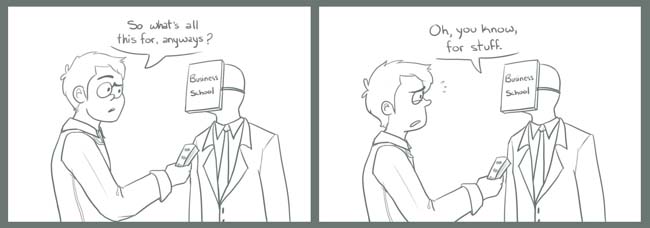After walking past the grandiose cupola of Alan B. Miller Hall at the College of William and Mary, you might suspect that students at the Mason School of Business pay more for their facilities and services. More importantly, after sitting in a cramped classroom in Tyler Hall, you might see Miller’s leather couches and think business students should pay more than other undergraduate students. Over the weekend, the Board of Visitors announced a plan that would require business school undergraduate students to pay $1500 per semester in fees starting in the 2013-14 school year. While this plan may be a practical solution for other schools, we do not support the College’s decision to increase business school students’ cost of attendance with a new flat-rate fee.
The business school needs enough funding to remain competitive, but we think that the method through which the College is seeking to raise funds is flawed. If the College intends to add fees for business school students, we want to see a budget that will lay out exactly where all of the additional revenue is going.
We are not opposed to additional fees for courses that require special materials, advanced technology or speakers. These kinds of fees are very familiar to music and kinesiology majors at the College. On a practical level, different services cost different amounts of money. Class fees can help accommodate this difference.
Flat-rate fees, however, seem to oppose Chancellor Robert Gates ’65 remarks at the Charter Day ceremony. As a public liberal arts school, the College has always fought against the idea that education is a private consumer good. Charging students more for a particular major seems to accept the idea that education is a private consumer good by commoditizing the cost and worth of a particular major.
The additional flat-rate fee for business students only exacerbates the divide between the College and business school. Further separating the business school from the Arts and Sciences program could lead to negative consequences for the College down the road. We all realize that students at the business school will likely make more money than their peers majoring in classical studies. Regardless, the College needs to remain close to the business school to remind students they are not just students at the Mason School of Business but also students at the College of William and Mary. Among other reasons, this way, any potential donations by business school alumni will be given to the College as a whole.
In an ideal world, the state would give all parts of the College as much money as they need in order to remain academically competitive. Given the number of editorials we have written asking the state for money, we understand we do not live in a perfect world. As such, we also understand the business school needs more funding to provide certain services. We do not believe, however, that a flat-rate tuition increase for all business students aligns with the College’s perspective that education is valuable because it improves society; if this is to occur, the reasons for additional fees must be made explicit so students know exactly why they are paying more.


This is the worst editorial I’ve ever read
Regardless of content, this is just poor quality writing.